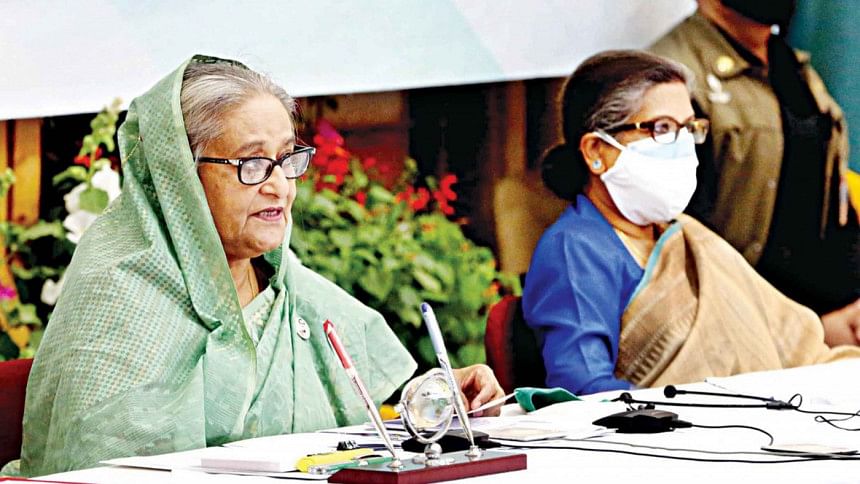Commentary by Mahfuz Anam: Celebrating our graduation

There are two realities of today's Bangladesh – the reality of graduation to a developing country and that of the repressions of digital security act, the former we celebrate and the latter we condemn. Today, however, we only celebrate.
Like millions of freedom fighters, I am also happy beyond measure that we have passed all the requirements to become a developing country and will formally become so in 2026, two years late due to the global pandemic.
This graduation has a special meaning for those of us who were present at the country's birth and who, however peripherally, played a small but proud role in it. We became a part of an exorable historical force that led to our liberation. We were not only sucked into this process but that our lives were totally shaped and driven by it. By some unknown and, it seemed at that time to be, unknowable cosmic force we all seemed to be woven together into collective consciousness inexorably pushing ourselves towards a tumultuous eventuality of which we were still only vaguely aware.
With each event the people of then East Pakistan, especially the students, were becoming more and more determined for the ultimate goal and through a very brave and tragic -- in terms of loss of lives- event we became independent Bangladesh.
Our struggle for independence ended in 1971 but the more complex task of nation building began right after. We had many handicaps – huge population, limited land, rudimentary infrastructure, largescale illiteracy and hardly any capital not to mention frequent natural disasters and almost regular floods. We started with an exceptional constitution, a timely election and some farsighted policy formulation. The assassination of the Father of the Nation along with family, save two daughters, and the killing inside the jail of the four national leaders including the brilliant war time prime minister, Tajuddin, dealt Bangladesh a near mortal blow. The two military dictatorships derailed our march forward in many substantive ways, especially institution building and democracy.
It is the restoration of democracy in 1991 that relaunched our journey towards realising our dreams of 1971 -- democracy, secularism and a society based on equality and social justice.
The journey of the last 30 years of democracy and development, in spite of the many ups and downs, has been uneven. Starting from early nineties to the beginning of the new millennium we had a greater play of democracy and freedom of expression including independent journalism than in the last decade. However, the last decade has the unique distinction of launching Bangladesh in a growth trajectory that belied all the doubters and forged the country in a new world of possibilities that it had never known before.
With the graduation to a developing country a new journey begins for Bangladesh. This journey will be of serious competition of producing goods and services both efficiently and economically making quality and pricing issues a central concern. We must remember that many of our global trading achievements have come due to special tariffs and preferential trading regimes. All this will be gone and we will be playing, so to speak in the real world.
Prime Minister Sheikh Hasina has rightly emphasised the need for sustaining the present achievements through relentless effort. But the real challenge is achieving "efficiency", which is far easier said than done. It involves decision making, resource allocation, most efficient use of funds, marketing and value chain efficacy. We have achieved many things but have never asked whether they were accomplished with the minimum resource required. The return on investment is a concept though popular among the private sector does not seem to exist in the public expenditure pattern repeatedly exemplified by the numerous times the date and budget of government projects are extended. As we graduate, we must make our financial sector more efficient and the whole administrative process transparent and accountable, the latter seems to exist nowhere in our system.
It was proper and correct for the PM to have given the credit to our people for graduation to ranks of developing countries. Our people have shown an extraordinary level of resilience and hard work. They have also surprised many of our development partners by their capacity to adopt new technologies and scientific methods in agriculture, making us the highest performers in many agri-products.
RMG sector is already globally known which has been added to by light engineering, ship building, pharmaceuticals, leather products and many FMCG items.
Our leaving behind the LDC status will obviously open up much greater prospects of FDI which, however will not be automatically so, unless we reform some of our governance system which includes the legal and regulatory regimes. Many of our institutions are still fundamentally politically driven which negatively influences foreign investors.
Corruption will remain a serious challenge to our future advancement. With global anti-corruption detection mechanism becoming more and more efficient, Bangladesh needs to seriously look into ways of reigning in the corrupt who now seem to have spread their wings everywhere.
Repressive measures and failures notwithstanding, this government and Sheikh Hasina as its leader deserve tremendous credit for leading the country to this level of development.Especially we credit her for having injected a "can do" feelings among the people and given the younger generation a new sense of confidence about the country and its future.
We have fought through our economic struggles well. Now let us handle our comparative economic success with diligence and maturity.

 For all latest news, follow The Daily Star's Google News channel.
For all latest news, follow The Daily Star's Google News channel. 



Comments